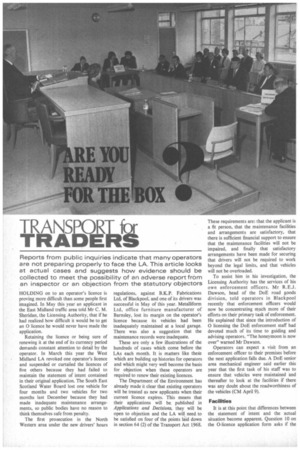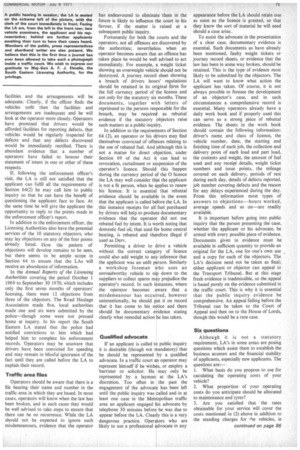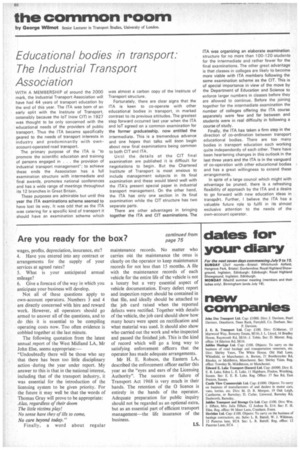TRANSPORTia TRADER
Page 76

Page 77

Page 88

If you've noticed an error in this article please click here to report it so we can fix it.
Reports from public inquiries indicate that many operators are not preparing properly to face the LA. This article looks at actual cases and suggests how evidence should be collected to meet the possibility of an adverse report from an inspector or an objection from the statutory objectors HOLDING on to an operator's licence is proving more difficult than some people first imagined. In May this year an applicant in the East Midland traffic area told Mr C. M. Sheridan, the Licensing Authority, that if he had realized how difficult it would be to get an 0 licence he would never have made the application.
Retaining the licence or being sure of renewing it at the end of its currency period demands constant attention to detail by the operator. In March this year the West Midland LA revoked one operator's licence and suspended or curtailed the licences of five others because they had failed to maintain the statement of intent contained in their original application. The South East Scotland Water Board lost one vehicle for four months and two vehicles for two months last December because they had made inadequate maintenance arrangements, so public bodies have no reason to think themselves safe from penalty.
The first prosecution in the North Western area under the new drivers' hours regulations, against B.K.P. Fabrications Ltd, of Blackpool, and one of its drivers was successful in May of this year. Metalliform Ltd, office furniture manufacturer of Barnsley, lost its margin on the operator's licence because its vehicles had been inadequately maintained at a local garage. There was also a suggestion that the maintenance records were inadequate.
These are only a few illustrations of the hundreds of cases which come before the LAs each month. It is matters like thege which are building up histories for operators and which might very well become the basis for objection when these operators are required to renew their existing licences.
The Department of the Environment has already made it clear that existing operators will be treated as new applicants when their current licence expires. This means that their applications will be. published in Applications and Decisions, they will be open to objection and the LA will need.to be satisfied on four of the points laid down in section 64 (2) of the Transport Act 1968.
These requirements are: that the applicant is a fit person, that the maintenance facilities and arrangements are satisfactory, that there is sufficient financial support to ensure that the maintenance facilities will not he impaired, and finally that satisfactory arrangements have been made for securing that drivers will not be required to work beyond the legal limits, and that vehicles will not be overloaded.
To assist him in his investigation, the Licensing Authority has the services of his own enforcement officers. Mr. R.E.J. Dawson, head of the DoE road goods division, told operators in Blackpool recently that enforcement officers would now be concentrating much more of their efforts on their primary task of enforcement. He explained that since the introduction of 0 licensing the DoE enforcement staff had devoted much of its time to guiding and advising operators. "The honeymoon is now over" warned Mr Dawson.
Operators can expect a visit from an enforcement officer to their premises before the next application falls due. A DoE senior area mechanical engineer said earlier this year that the first task of his staff was to ensure that vehicles were maintained 'and thereafter to look at the facilities if there was any doubt about the roadworthiness of the vehicles (CM April 9).
Facilities It is at this point that differences between the statement of intent and the actual situation become apparent. Question 10 on the 0-licence application form asks if the facilities and the arrangements will be adequate. Clearly, if the officer finds the vehicles unfit then the facilities and arrangements are inadequate and he will look at the operator more closely. Operators have promised that drivers would be afforded facilities for reporting defects, that vehicles would be regularly inspected for defects and that any defects discovered would be immediately rectified. There is abundant evidence that a number of operators have failed to honour their statement of intent in one or other of these respects.
If, following the enforcement officer's. visit, the LA is still not satisfied that the applicant can fulfil all the requirements of Section 64(2) he may call him to public inquiry so that he can have the benefit of questioning the applicant face to face. At the same time he will give the applicant the opportunity to reply to the points made in the enforcement officer's report.
In addition to the enforcement officer, the Licensing Authorities also have the potential services of the 10 statutory objectors, who may lay objections on any of the four points already listed. How the pattern of objections will develop remains to be seen, but there seems to be ample scope in Section 64 to ensure that the LAs will receive an abundance of information.
In the Annual Reports of the Licensing Authorities covering the period October 1 1969 to September 30 1970, which includes only the first seven months of operators' licensing, there were 12 objections from three of the objectors. The Road Haulage Association made five, local authorities made one and six were submitted by the police—though some were not pressed home at• inquiry. In his report the South Eastern LA stated that the police had notified convictions to him which had helped him to complete his enforcement records. Operators may, be unaware that drivers have been convicted for speeding and may remain in blissful ignorance of the fact until they are called before the LA to explain their record.
Traffic area files Operators should be aware that there is a file bearing their name and number in the traffic area in which they are based. In most cases, operators will know when the law has been broken, and in such cases they would be well advised to take steps to ensure that there can be no recurrence. While the LA should not be expected to ignore such misdemeanours, evidence that the operator has endeavoured to eliminate them in the future is likely to influence the court in his favour, if the matter is raised at a subsequent public inquiry.
Fortunately for both the courts and the operators, not all offences are discovered by the authorities; nevertheless when an operator becomes aware that an offence has taken place he would be well advised to act immediately. For example, a weight ticket showing an overweight vehicle should not be destroyed. A journey record sheet showing a breach of drivers hours' regulations should be retained in its original form for the full currency period of the licence and not only for the statutory six months. These documents, together with letters of reprimand to the persons responsible for the breach, may be required as rebuttal evidence if the statutory objectors raise such matters at a public inquiry.
In addition to the requirements of Section 64 (2), an operator or his drivers may find themselves convicted of offences relating to the use of rebated fuel. And although this is not a matter for direct objection, under Section 69 of the Act it can lead to revocation, curtailment or suspension of the operator's licence. Should this happen during the currency period of the 0 licence the LA may well consider that the applicant is not a fit person, when he applies to renew his licence. It is essential that rebuttal evidence should be available in the event that the applicant is called before the LA. In this instance receipts for all fuel purchased by drivers will help to produce documentary evidence that the operator did not use rebated fuel by intent. It is worth noting that domestic fuel oil, that used for home central heating, is rebated and therefore illegal if used as Derv.
Permitting a driver to drive a vehicle without the correct category of licence could also add weight to any inference that the applicant was an unfit person. Similarly a workshop foreman who uses an unroadworthy vehicle to nip down to the suppliers to collect spares may prejudice the operator's record. In such instances, where the operator becomes aware that a misdemeanour has occurred, however unintentionally, he should put it on record that it has come to his notice and there should be documentary evidence stating clearly what remedial action he has taken.
Qualified advocate If an applicant is called to public inquiry it is desirable (though not mandatory) that he should be represented by a qualified advocate. In a traffic court an operator may represent himself if he wishes, or employ a barrister or solicitor. He may only be represented by a layman at the LA's discretion. Too often in the past the engagement of the advocate has been left until the public inquiry was called and in at least one case in the Metropolitan traffic area an applicant engaged his advocate by telephone 30 minutes before he was due to appear before the LA. Clearly this is a very dangerous practice. Operators who are likely to use a professional advocate in any
appearance before the LA should retain one as soon as the licence is granted. so that they know the sort of material he will need should a case arise.
To assist the advocate in the presentation of a clear case, documentary evidence is essential. Such documents as have already been mentioned, faulty weight tickets or journey record sheets, or evidence that the law has been in some way broken, should be retained. This is the type of evidence most likely to be submitted by the objectors. The LA will want to know what action the applicant has taken. Of course, it is not always possible to foresee the development of an objector's case, and in such circumstances a comprehensive record is essential. Many operators already have a daily work book and if properly used this can serve as a strong piece of rebuttal evidence. The sheets in the work book should contain the following information: driver's name and class of licence, the vehicle number, date, the starting and finishing time of each job, the collection and delivery point of each load and part load, the contents and weight, the amount of fuel used and any receipt details, weight ticket numbers and issue points, the mileage covered on each delivery, periods of rest during each day, details of defects reported, job number covering defects and the reason for any delays experienced during the day. From this information most types of answers to objections—hours worked, average speeds and so on—are readily available.
It is important before going into public inquiry that the person presenting the case, whether the applicant or his advocate, be armed with every possible piece of evidence. Documents given in evidence must be available in sufficient quantity to provide an original for the LA, one for one's own use and a copy for each of the objectors. The LA's decision need not be taken as final; either applicant or objector can appeal to the Transport Tribunal. But at this stage fresh evidence is inadmissible, so the appeal is based purely on the evidence submitted in the traffic court. This is why it is essential that the public inquiry evidence be comprehensive. An appeal failing before the Tribunal can be taken to the Court of Appeal and then on to the House of Lords, though this would be a rare case.
Six questions Although it is not a statutory requirement, LA's in some areas are posing questions which assist them to establish the business acumen and the financial stability of applicants, especially new applicants. The questions are: 1. What basis do you propose to use for caculating the operating costs of your vehicle?
2. What proportion of your operating costs äo you anticipate should be allocated to maintenance and tyres?
3. Are you satisfied that the rates obtainable for your service will cover the costs mentioned in (2) above in addition to the standing charges for the vehicles, ie
Are you ready for the box?
wages, profits, depreciation, insurance, etc?
4. Have you entered into any contract or arrangements for the supply of your services at agreed rates?
5. What is your anticipated annual mileage?
6. Give a forecast of the way in which you anticipate your business will develop.
Not all of these questions apply to own-account operators. Numbers 3 and 4 are directly concerned with hire and reward work. However, all operators should go armed to answer all of the questions, and to do this it is essential to be compiling operating costs now. Too often evidence is cobbled together at the last minute.
The following quotation from the latest annual report of the West Midland LA. Mr John Else, seems appropriate:—
"Undoubtedly there will be those who say that there has been too little disciplinary action • during the year under report. My answer to this is that in the national interest, including that of the transport industry, it was essential for the introduction of the licensing system to be given priority. For the future it may well be that the words of Thomas Gray will prove to be appropriate: Alas, regardless of their doom
The little victims play!
No sense have they of ills to come, No care beyond today."
Finally, a word about regular
maintenance records. No matter who carries out the maintenance the onus is clearly on the operator to keep maintenance records for not less than 15 months. A file with the maintenance records of each vehicle for the entire life of the vehicle is not a luxury but a very essential aspect of vehicle documentation. Every defect report and inspection report should be contained in that file, and ideally should be attached to the job card raised when the reported defects were rectified. Together with details, of the vehicle, the job card should show how many hours were spent on rectification and what material was used. It should also show who carried out the work and who inspected and passed the finished job. This is the kind of record which will go a long way to satisfying enforcement officers that the operator has made adequate arrangements.
Mr H. E. Robson, the Eastern LA, described the enforcement officer earlier this year as the "eyes and ears of the Licensing Authority". The success or failure of Transport Act 1968 is very much in their hands. The retention of the 0 licence is entirely in the hands of the operator. Adequate preparation for public inquiry should not be regarded as an optional extra, but as an essential part of efficient transport management—the life insurance of the business.












































































































































